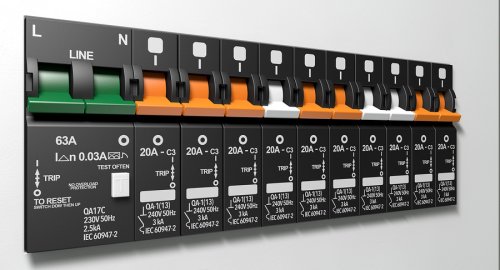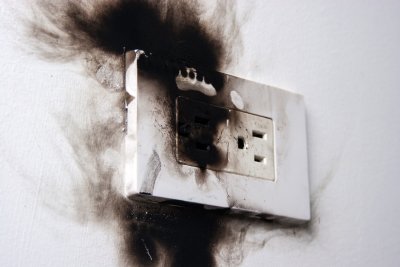-
The Differences Between Circuit Breakers and Fuses
Circuit breakers are standard features in today’s homes. When you are considering purchasing a new house, you will want to determine whether your property is equipped with a circuit breaker box or a fuse box. Typically, only houses that were built before 1960 will contain fuse boxes. An electrician serving San Jose may recommend that you replace your home’s outdated fuse box with a brand new circuit breaker system.
One of the primary differences between circuit breaker boxes and fuse boxes is the operation of each type of unit. The fuses inside of a fuse box are designed to blow out during a power surge. After a fuse has blown, it will need to be replaced before power is restored to that area. By contrast, circuit breakers simply switch off when an electrical current causes a surge. Since circuit breakers do not blow, they offer greater convenience and safety to the homeowner.

-
Circuit Breakers 101
Circuit breakers are designed to shut off power to a circuit if an electrical surge is detected. This video will provide you with some essential information about the circuit breakers in your home. When your circuit breakers are tripped, it will be up to you to turn the power back on. For example, if a single GFCI socket has been tripped, you will be able to reset the power on the outlet, itself. An electrician serving San Jose can answer your questions about circuit breaker safety.
If you have noticed that your circuit breakers are tripping frequently, it may be time to hire a residential electrician. An electrician can address issues in your electrical panel, and recommend any necessary updates or repairs. Rewiring certain areas of your home will help to prevent your home’s outlets from getting overloaded.
-
Common Causes of Tripped Circuit Breakers
When your appliances shut off and your power goes out for no apparent reason, the culprit may be a tripped circuit breaker. If you don’t want to call your electrician serving San Jose every time this occurs, you will need to understand what is causing the issue. Watch this video for a look at some of the common causes of tripped circuit breakers.
The purpose of your electrical circuit breaker is to interrupt a circuit when too much power is introduced. Thus, your circuit breaker might trip if you plug too many appliances into the same outlet; when the circuit overloads, the breaker springs into action. Although this is a common cause of a tripped breaker, it’s not the only one. It can also occur if a wire inside your receptacle box becomes loose, you use a damaged extension cord, or you accidentally puncture an electrical wire when doing some home decorating or remodeling.
-
The Importance of Arc Fault Circuit Interrupters
As a homeowner, you want to make your home as safe as possible for yourself and your family. As you look around your home, you might assume that you’ve already achieved maximum safety. However, one of the greatest potential risks is out of sight: the electrical system behind your walls. Fortunately, maximizing the safety of your electrical system is as easy as calling an electrician in San Jose . If you haven’t already, you should have a professional install arc fault circuit interrupters (AFCI) throughout your electrical system.

Arc Fault Basics
Under normal circumstances, electricity should travel safely throughout your home via electrical wires, or conductors. An arc fault occurs when electricity travels outside of safe conductors. A big enough arc could ignite insulation or another flammable part of your home, contributing to a disastrous electrical fire; in fact, arc faults are among the leading causes of electrical fires in this country. The older the wiring, the higher the risk of arc faults.
How AFCI Breakers Work
An arc fault circuit interrupter is designed to detect a dangerous electrical arc and promptly interrupt the circuit before a fire can ignite. When an arc fault occurs, it creates a sharp spike and drop that is easily detectible by an AFCI breaker. However, an AFCI breaker is sophisticated enough to tell the difference between a safe, normal arc and a potentially harmful arc fault.
Why They’re Important
Traditional circuit breakers are also important for electrical safety, but they alone cannot protect from electrical fires. A circuit breaker will only interrupt a circuit in the event of a short circuit or overload, and cannot detect an arc fault. AFCI breakers are so important that the U.S. electrical code now requires them in most newly constructed dwelling units. If your home has old wiring and does not yet have AFCI breakers, consider speaking with an electrician in San Jose. AFCI breakers are generally inexpensive and easy to install.
RECENT POSTS
categories
- Uncategorized
- Delta Electric
- Commercial Electrical
- Residential Electrical
- Electric Circuits
- Dedicated Circuits
- Circuit Breakers
- Electrical Panels
- Electrical Wiring
- Safety Inspections
- copper wires
- Electrician San Jose
- Trained Electricians
- Electrical Services San Jose
- Malfunctioning Electrical Outlets
- Circuit Breaker
- Grounding
- safety
- Flickering Lights
- Arc Fault Breakers
- electrical system
- Aluminum Wiring
- Circuit Interrupters
- House Surge Protection
- Zinsco Panel Warnings
- Wiring Conversion
- GFCI outlet
- professional electrician
- Knob-and-Tube Wiring
- modern home electrical system
- Fuses
Archives
2024
2023
2018
2017
- December (4)
- November (4)
- October (5)
- September (4)
- August (4)
- July (4)
- June (4)
- May (4)
- April (4)
- March (3)
- February (4)
- January (3)
2016
- December (3)
- November (4)
- October (4)
- September (4)
- August (4)
- July (4)
- June (4)
- May (4)
- April (4)
- March (4)
- February (4)
- January (4)
2015
- December (4)
- November (4)
- October (4)
- September (4)
- August (3)
- July (4)
- June (4)
- May (3)
- April (4)
- March (4)
- February (2)
2014
- December (3)
- November (4)
- October (4)
- September (6)
- August (2)
- July (3)
- May (2)
- April (1)
- March (2)
- February (1)
- January (1)

